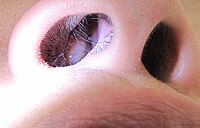
Photo from wikipedia
Chronic rhinosinusitis with nasal polyposis (CRSwNP) is a group of multifactorial and heterogeneous disorders with a significant economic strain on society, likely made up of different endotypes, each with a… Click to show full abstract
Chronic rhinosinusitis with nasal polyposis (CRSwNP) is a group of multifactorial and heterogeneous disorders with a significant economic strain on society, likely made up of different endotypes, each with a unique pathomechanism. In addition to the traditional clinical measures, there is a recognized need for reliable biomarkers to provide predictive information regarding diagnosis, endotypes, treatment responses, and future risk of recurrence. Fueled by the advances in basic research, various biomarkers have been explored in recent years. Biomarkers of CRSwNP can originate from a variety of sources, including nasal secretions, nasal biopsies, exhaled breath, and peripheral blood. In this review, we aim to summarize the existing and emerging biomarkers available for the evaluation and management of CRSwNP. Currently, eosinophil count in nasal mucosa has proved particularly valuable for endotyping, assessing disease severity, and predicting steroid responsiveness and surgical outcomes. Blood eosinophilia may be used as a surrogate for tissue eosinophilic inflammation, whereas its utility remains limited. Type 2 cytokines, such as IL-4, IL-5, and IL-13, and IgE have been identified as potential therapeutic targets. Moreover, matrix metalloproteinases (MMP)-9 is linked to healing quality after sinus surgery. Nasal nitric oxide (nNO) appears to fill the niche as a noninvasive measure for sinus ostial patency. In addition, recent data have shown some promising biomarkers involved in corticosteroid resistance and olfactory dysfunction. However, rigorous validation using large cohort studies is necessary before these biomarkers can be mainstreamed into clinical practice.
Journal Title: European Archives of Oto-Rhino-Laryngology
Year Published: 2017
Link to full text (if available)
Share on Social Media: Sign Up to like & get
recommendations!